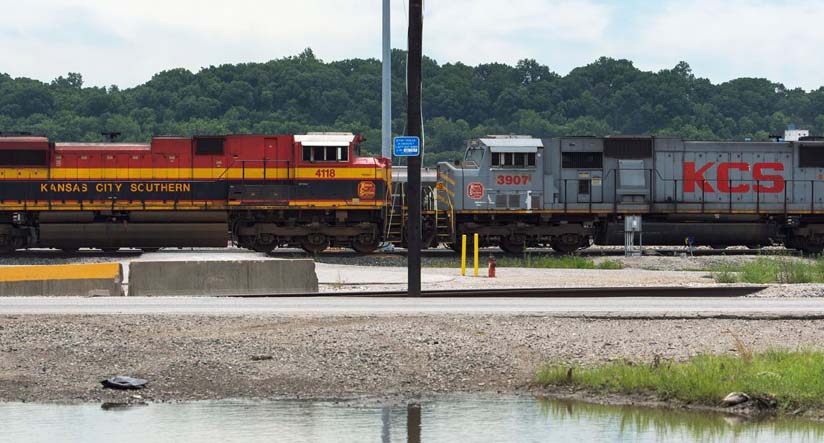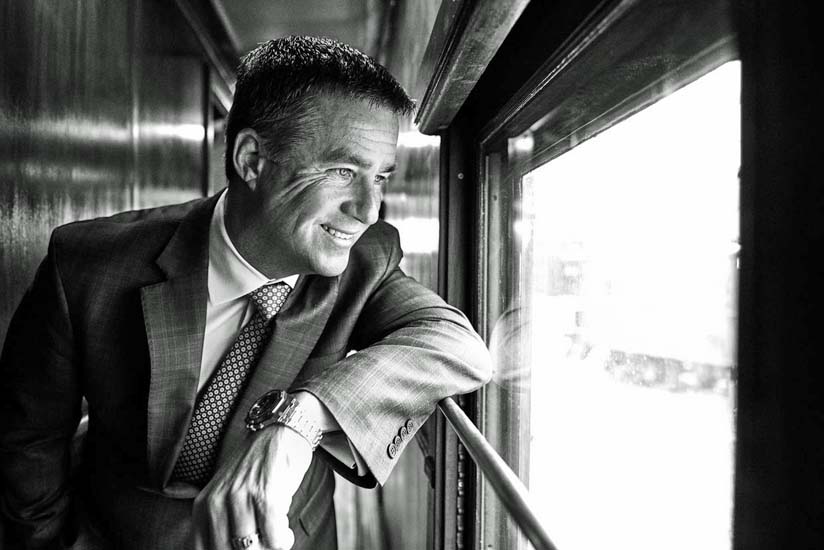
North America - Sunday will be a crucial moment in the life of Keith Creel.
12 Sep 2021 marks the deadline for KCS to accept the US$27.2 billion takeover bid launched by CP, where Mr. Creel is chief executive officer.
His quest for the U.S. railway has had plenty of twists and turns since he initiated the bid in March, which is to say, anything could still
happen.
But if Mr. Creel succeeds, victory will be all the sweeter since he'll be snatching KCS away from CN, his chief rival and former employer.

"He would probably never publicly admit to it, but it has to be personally satisfying. He was able to play the underdog political role rather than trying
to outbid the bigger and richer company," says Anthony Hatch, a railway analyst at ABH Consulting in New York.
Should the deal go through, Mr. Creel will also be achieving something his mentor and predecessor, Hunter Harrison, never did, expanding the CP network map,
and in a big way.
Winning KCS would give the Calgary-based railway a network that touches the Gulf of Mexico and the Pacific Ocean, extending through the U.S. agricultural and
petroleum regions, and down into the Mexican auto-making heartland.
The Alabama-born Mr. Creel, 53, is highly regarded in the rail industry for his leadership at CP, one of the smallest of the Big Seven railways that operate
in the U.S.
Since he took charge in 2017, the company's revenue has climbed 17 percent to $7.7 billion, built on the lean operating model imposed by Mr. Harrison, who led
CP from 2012 to 2017.
"My impression is he has done a perfect job," Bill Ackman, an activist investor who runs Pershing Square Capital in New York, says of Mr. Creel's
campaign to win KCS.
Mr. Ackman played an important role in paving the way for Mr. Creel to join CP.
First, he encouraged Mr. Harrison, a legend in the railway industry, to come out of retirement to run CP, waging a bruising boardroom brawl to successfully
install him as CEO.
Mr. Harrison then poached his protege from rival CN.
"Every board focuses on succession planning, and Keith was really the succession plan," says Mr. Ackman.
In early 2017, Mr. Harrison left CP after slashing costs, running longer trains, and laying off thousands as part of his successful bid to turn around the
under performing railway.
Mr. Creel took over.
"The question a lot of people had when Hunter stepped down was, what more can be done? Keith has proven that a lot more can be done," Mr. Ackman
says.
Mr. Creel set to work at CP trying to improve relationships with customers and employees, meeting with union leaders, staff, and shippers.
"Over the last four years, we've had some feathers that have been ruffled," he said at the time.
He softened the employee disciplinary system, criticized by union members as harsh and arbitrary.
He created the position of chief marketing officer, a position Mr. Harrison never bothered with, and heralded a new focus on the companies that paid CP to
move their goods.
He also widened the railway's reach.
Despite CP's historic reputation as the railway that created Canada, it remained about half the size of CN, whose tracks reach both Canadian coasts and extend
down to the Gulf of Mexico.
CP's ran only as far east as Montreal.
South of the border, it was largely confined to the upper Midwest.
Under Mr. Creel, CP bought the Central Maine & Quebec Railway in 2019, giving the company tracks that stretched to the Atlantic Ocean, into the ports of
Saint John and Searsport, Maine.
Mr. Creel, who was not available for an interview, has said he never thought he'd work in the rail industry.
Instead, he joined the U.S. military while completing a marketing degree at Jacksonville State University in Alabama.
He was deployed to Saudi Arabia during the Gulf War, where he served as a commissioned officer.
His time in the military was a formative experience for him, he has said, teaching him about leadership, and instilling a dedication to serving
others.
After he completed his tour in Saudi Arabia, he learned from a friend that Burlington Northern Railway was hiring.
Mr. Creel, who absorbed a lot about logistics and operations while in the military, believed those skills would be useful at a railway.
He had initially thought he could pursue a marketing career given his university education, but then had a realization.
"I said, if I'm going to sell the business, I need to understand the business. So I stepped into operations, and I never came out," he told Railway
Age, an industry publication.
He joined as an intermodal ramp manager in 1992 in Birmingham, Alabama, and four years later took a job at Illinois Central Railroad as a
trainmaster.
On his first day, he was summoned to the 21st floor of a Chicago office tower for a chat with Mr. Harrison, who ran the company at the time.
Mr. Harrison was already an imposing figure at that stage of his career, known as an unsentimental, hard-driving, executive and an evangelist for
precision-scheduled railroading, an operating model that has swept the North American industry.
Mr. Harrison, a Tennessee native, took the young Alabaman under his wing, dispatching him to rail yards across the country, and giving him the opportunity to
learn the intricacies of the business.
Indeed, Mr. Creel has travelled a lot in his career.
His family, which includes a son and a daughter, now adults, has moved 13 times.
"I've been to places you don't even know exist," he once boasted in a speech. (He's primarily based in Florida these days.)
Mr. Creel proved to be an adept, and devoted, problem-solver.
One night in 1999, he received a call from a co-worker at a Michigan train yard who told him there were no hotel rooms available for crews set to arrive
imminently.
Beds were either booked, or the empty rooms needed cleaning, with staff not set to scrub them until morning.
Mr. Creel showed up at the hotel and convinced management to let him and another employee turn over the rooms themselves, he recounted to Progressive
Railroading, another trade publication.
He stayed close to Mr. Harrison throughout his career, and both became part of CN when it purchased Illinois Central in 1998.
Mr. Harrison served as CEO for six years until retiring in 2009, and Mr. Creel became chief operating officer the following year.
After a brief stint apart, they reunited at CP.
(Mr. Harrison died in 2017 at age 73.)
The two shared much in common beyond their Southern roots.
Both were competitive individuals who learned about the rail industry from the ground up.
Mr. Creel's management approach is similar to his mentor's, only with the rougher edges sanded off.
He often uses the phrase "constructive tension" to describe the ideal operating conditions at a company, while demanding excellence from his
staff.
"You don't want to disappoint him because you're going to get your rear end chewed out," says Tim Marsh, who reported to Mr. Creel for two years as
a senior vice-president at CP.
But Mr. Marsh says his boss challenged people in all the right ways, and led by example, always the first to arrive, and the last to leave.
Early in his tenure, he got a call from Mr. Creel's assistant at six in the morning, asking if he could meet with the boss.
Mr. Marsh was still in bed, but he wasn't annoyed.
"That was probably just his way of saying we wake up early here and go to bed late."
Mr. Creel's pursuit of KCS has no doubt entailed many late nights.
CP first made an offer in March, only to be outbid by CN and see it strike a deal with KCS.
Those plans were thwarted by the U.S. Surface Transportation Board in August when it rejected CN's application to form a voting trust to hold KCS shares while
awaiting a ruling on the actual takeover.
That put Mr. Creel's offer back in play.
"He's been super-straightforward with the shareholders and the public. It is basically inevitable that the Kansas City board is going to choose
CP," says Mr. Ackman.
The idea of inevitability and fate is something Mr. Creel has occasionally referenced in his public addresses, even going so far as to hint at the role of God
in his life and referencing his Christian values.
He told Railway Age it was "God's hand" that brought him to CP, while on Facebook, his wife, Ginger, is even more overt.
"He truly feels like this is God's will for his life! He's been given a platform and seeks God's guidance and wisdom in every decision he
makes!"
The fate of Mr. Creel's bid for KCS will now be determined by the 10 members of its board of directors.
But given the tumultuous ride Mr. Creel has had trying to close the deal, it's little wonder he might seek some help from above.
Eric Atkins.
(there was no image with original article)
(usually because it's been seen before)
provisions in Section 29 of the Canadian
Copyright Modernization Act.
